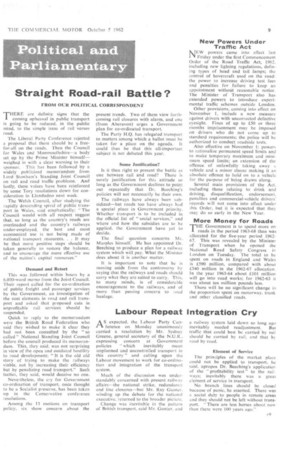Straight Road-rail Battle?
Page 11

If you've noticed an error in this article please click here to report it so we can fix it.
FROM OUR POLITICAL CORRESPONDENT
THERE are definite signs that the coming upheaval in public transport is going to be reduced, in the public mind, to the simple issue of rail versus road.
The Liberal Party Conference rejected a proposal that there should be a freefor-all on the rOads. Then the Council for Wales and Monmouthshire—a body set up by the Prime Minister himself— weighed in with a clear warning to their sponsor. This has been followed by a widely publicized memorandum from Lord 'Stonham's Standing Joint Council on rail and road traffic problems. And lastly, these voices have been reinforced by some Tory resolutions down for consideration in Llandudno next week.
• The Welsh Council, after studying the rapidly descending spiral of public transport in Wales, said emphatically: " The Council would with all respect suggest that, so long as the country's roads are overloaded and the country's railways under-employed, the best and most economical use is not being made of national transport resources. . . It may be that more positive steps should be taken generally to restore the balance, and to encourage the more effective use of the nation's capital resources."
Demand and Retort This was followed within hours by a 6.000-word memo from the Joint Council. Their report called for the co-ordination of public freight and passenger services by the Government, an investigation of the cost elements in road and rail transport and asked that proposed cuts in unprofitable rail services should be suspended.
Quick to reply to the memorandum were the British Road Federation who said they wished to make it clear they had not been consulted by the "so called" National Standing Joint Council before the council produced its memorandum. This, they said, was not surprising in view of the open and outdated hostility to road development: "It is the old old story of trying to make the railways viable, not by increasing their efficiency but by penalizing road transport." Such tactics, they said, would deceive no one.
Nevertheless, the cry for Government co-ordination of transport, once thought to be a Socialist preserve, has been taken up in the Conservative conference resolutions.
Among the 13 motions on transport policy, six show concern about the present trends. Two of them view forthcoming rail closures with alarm, and one (from Aberavon) urges a Government plan for co-ordinated transport.
The Party H.Q. has relegated transport to matters among which a ballormust he taken for a place on the agenda. It could thus be that this all-important subject is not debated this year.
Some Justification7
ls it then right to present the battle as one between rail and road? There is surely justification for this attitude so long as the Government declines to point out repeatedly that Dr. Beeching's policies will not necessarily be their own.
The railways have always been subsidized—but road's too have always had a special place in Government priority. Whether transport is to he included in the official list of " social services," and where and how the subsidies are to be applied, the Government have yet to decide.
The final question concerns Mr. Marples himself. He has appointed Dr. Beeching to produce a plan for a railway system which will pay. What the Minister does about it is another matter.
It is important to note that he is moving aside from the controversy by saying that the railways and roads should carry what they are suited to carry. This, to many minds, is of considerable encouragement to the railways, and of more than passing concern to road haulage.
























































































































